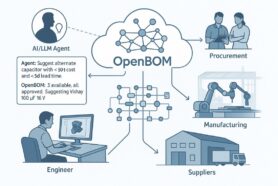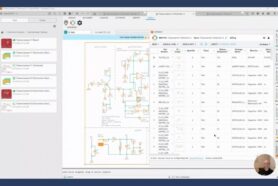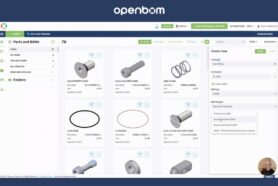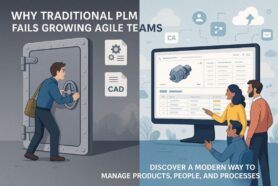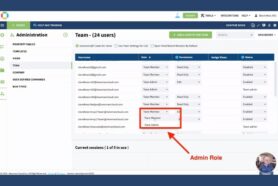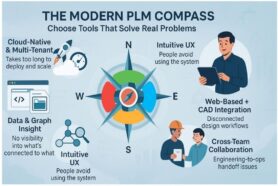
For every manufacturing company in today’s fast-paced business world, efficient data management is crucial for success. Whether you’re a manufacturer, engineer, or part of a supply chain, you’ve likely encountered common pains associated with data management: scattered data across multiple files, duplicates, errors, lack of traceability, references, history, and revisions.
At OpenBOM we work with engineering and manufacturing companies that are looking at how to address these pains and we offer a powerful solution of organizing data with scale and flexibility.
The fundamental problem of every company is data management. While the problem has been around for ages, to solve the problem is not as simple as it may sound. The challenge is to provide a solution that is capable of managing information in a robust way, but at the same time not to disrupt business processes and operations. That’s the main reason why many companies are deciding to jump to spreadsheets.
OpenBOM offers something better -we combine the power of a simple spreadsheet paradigm with sophisticated data management. We combine flexible data management with the ability to manage relationships and dependencies. We combine the power of simple data visualization with the ability to manage files.
In my article today, I want to talk about typical use cases of painful data management problems we see at companies coming to OpenBOM for help. I also want to suggest how OpenBOM solves these problems. But let me start with typical painful points.
Addressing Common Pains:
1. Data in Multiple Files:
Managing data spread across numerous files can be a nightmare. OpenBOM consolidates all your data into a single platform, providing a central repository for easy access and organization. No more hunting through folders and files to find the information you need.
2. Duplicates and Errors:
Duplicate data and errors can lead to costly mistakes. OpenBOM’s data validation tools help identify and eliminate duplicates, ensuring data accuracy and integrity. The foundation of OpenBOM data objects allows for tracking of redundancy and duplications, distribution of unique item numbers, and check dependencies. Say goodbye to redundant information and costly errors.
3. No Traceability:
Traceability is essential for product lifecycle management. OpenBOM enables you to track changes, view revisions, and maintain a complete audit trail. You’ll always know who did what, and when, enhancing transparency and accountability.
4. No References:
Without proper references, it’s challenging to understand how components relate to each other. OpenBOM provides robust referencing capabilities, allowing you to establish connections between items, subassemblies, and assemblies. This feature simplifies complex projects and ensures consistency.
5. No History/Revisions:
Tracking the history of your data and revisions is essential for compliance and quality control. OpenBOM maintains a comprehensive revision history, allowing you to roll back to previous versions and analyze changes over time.
Delivering Values and Functions:
1. A Single Platform:
OpenBOM serves as a single, unified platform for all your data management needs. No more switching between multiple tools or applications. The data resides in OpenBOM and we allow a flexible mechanism to share and export information if needed.
2. Flexible Data:
OpenBOM is highly flexible, accommodating various data formats, from simple spreadsheets to complex CAD files. You can seamlessly integrate data from different sources.
3. Customizable Objects/Attributes:
Tailor OpenBOM to your specific requirements by customizing objects and attributes. Adapt the platform to your unique workflow, ensuring it aligns with your business processes.
4. File Attachments:
Easily attach files, documents, and drawings to your BOMs and items within OpenBOM. This feature ensures all relevant information is in one place for quick reference.
5. Data Dependencies, Where Used:
Gain insights into how your data is connected with OpenBOM’s data dependency and “where used” functionality. Understand the impact of changes on your entire product ecosystem.
6. Graph Navigation:
Navigate your data visually with OpenBOM’s graph navigation. This feature simplifies complex relationships and helps you understand the structure of your assemblies and subassemblies.
7. Cost Calculation and Formulas:
Effortlessly calculate costs and use formulas within OpenBOM to ensure accurate pricing and budgeting for your projects.
8. CAD Files and Document Management:
For projects that require CAD files, OpenBOM provides robust CAD file management capabilities. Keep your design and engineering documents organized and easily accessible.
9. Inventory and PO Management:
Manage your inventory and purchase orders within OpenBOM, streamlining the procurement process and ensuring you have the right parts when you need them.
10. Orders and Gap Calculations:
Stay on top of your orders and gap calculations to avoid production delays and maintain a smooth workflow.
Conclusion:
OpenBOM is more than just a data management platform; it’s a comprehensive solution that addresses your pains while delivering valuable functions to streamline your business processes. With its centralized approach, robust features, and flexibility, OpenBOM empowers you to optimize your operations, improve efficiency, and achieve greater success in today’s competitive landscape.
REGISTER FOR FREE and check how OpenBOM can help you today.
Best, Oleg
Join our newsletter to receive a weekly portion of news, articles, and tips about OpenBOM and our community.





